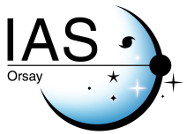GREEN BANK TELESCOPE ZPECTROMETER CO(1-0) OBSERVATIONS OF THE STRONGLY LENSED SUBMILLIMETER GALAXIES FROM THE HERSCHEL ATLAS
| Titre | GREEN BANK TELESCOPE ZPECTROMETER CO(1-0) OBSERVATIONS OF THE STRONGLY LENSED SUBMILLIMETER GALAXIES FROM THE HERSCHEL ATLAS |
| Type de publication | Journal Article |
| Year of Publication | 2011 |
| Auteurs | Frayer, DT, Harris, AI, Baker, AJ, Ivison, RJ, Smail, I, Negrello, M, Maddalena, R, Aretxaga, I, Baes, M, Birkinshaw, M, Bonfield, DG, Burgarella, D, Buttiglione, S, Cava, A, Clements, DL, Cooray, A, Dannerbauer, H, Dariush, A, de Zotti, G, Dunlop, JS, Dunne, L, Dye, S, Eales, S, Fritz, J, Gonzalez-Nuevo, J, Herranz, D, Hopwood, R, Hughes, DH, Ibar, E, Jarvis, MJ, Lagache, G, Leeuw, LL, Lopez-Caniego, M, Maddox, S, Michallowski, MJ, Omont, A, Pohlen, M, Rigby, E, Rodighiero, G, Scott, D, Serjeant, S, Smith, DJB, Swinbank, AM, Temi, P, Thompson, MA, Valtchanov, I, van der Werf, PP, Verma, A |
| Journal | Astrophysical Journal Letters |
| Volume | 726 |
| Date Published | Jan |
| ISBN Number | 2041-8205 |
| Numéro d'accès | WOS:000285710700008 |
| Résumé | The Herschel Astrophysical Terahertz Large Area Survey (H-ATLAS) has uncovered a population of strongly lensed submillimeter galaxies (SMGs). The Zpectrometer instrument on the Green Bank Telescope (GBT) was used to measure the redshifts and constrain the masses of the cold molecular gas reservoirs for two candidate high-redshift lensed sources. We derive CO(1-0) redshifts of z = 3.042 +/- 0.001 and z = 2.625 +/- 0.001, and measure molecular gas masses of (1-3) x10(10) M-circle dot, corrected for lens amplification and assuming a conversion factor of alpha = 0.8M(circle dot) (Kkm s-(1) pc(2))(-1). We find typical L(IR)/L'(CO) ratios of 120 +/- 40 and 140 +/- 50L(circle dot) (Kkm s(-1) pc(2))(-1), which are consistent with those found for local ultraluminous infrared galaxies (ULIRGs) and other high-redshift SMGs. From analysis of published data, we find no evidence for enhanced L(IR)/L'(CO(1-0)) ratios for the SMG population in comparison to local ULIRGs. The GBT results highlight the power of using the CO lines to derive blind redshifts, which is challenging for the SMGs at optical wavelengths given their high obscuration. |



